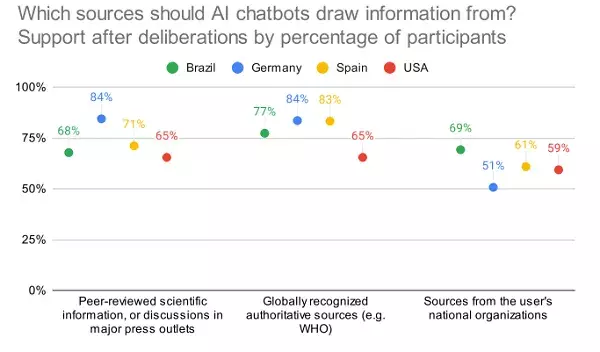The recent partnership between Meta and Stanford’s Deliberative Democracy Lab aimed to shed light on the expectations and concerns surrounding the development of generative AI. The community forum gathered feedback from over 1,500 participants from Brazil, Germany, Spain, and the United States. Among the key findings were that the majority of participants across all countries believed that AI has had a positive impact. Additionally, there was a consensus that AI chatbots should be allowed to use past conversations to enhance their responses, as long as users are informed about this process.
Interestingly, the forum revealed that the specific issues that garnered the most positive and negative responses varied by region. Participants also exhibited some shifts in their opinions throughout the discussions. This highlights the diverse perspectives on the benefits and risks associated with AI. The study also delved into consumer attitudes towards AI disclosure and the sources from which AI tools should derive their information.
One of the more controversial topics explored in the study was whether users should be allowed to form romantic relationships with AI chatbots. While this may seem unconventional, it raises important questions about the evolving nature of human-AI interactions. Another critical aspect that emerged from the research was the control and biases present in AI tools developed by different companies. Google and Meta, for instance, faced criticisms for the distorted results generated by their AI models. This underscores the need for greater scrutiny and regulation to ensure fair representation and accuracy in AI outputs.
As the discussion around generative AI continues to evolve, there is a growing recognition of the need for universal safeguards to protect users from misinformation and manipulation. The question of whether corporations should wield unchecked control over AI tools, and the necessity of broader regulatory frameworks to maintain balance and accountability, remains unresolved. The complexities surrounding the influence of AI models on the outcomes they produce add another layer of complexity to the ethical debate surrounding AI development.
While many questions raised in the discourse on generative AI lack definitive answers, it is evident that there is a pressing need for ethical guidelines and regulatory oversight in this rapidly advancing field. As we strive to harness the potential benefits of AI technology, it is crucial to navigate the ethical implications thoughtfully and weigh the impact of our decisions on broader societal outcomes. The ongoing debate serves as a reminder of the complexities inherent in AI development and the imperative of fostering responsible innovation in this domain.


Leave a Reply